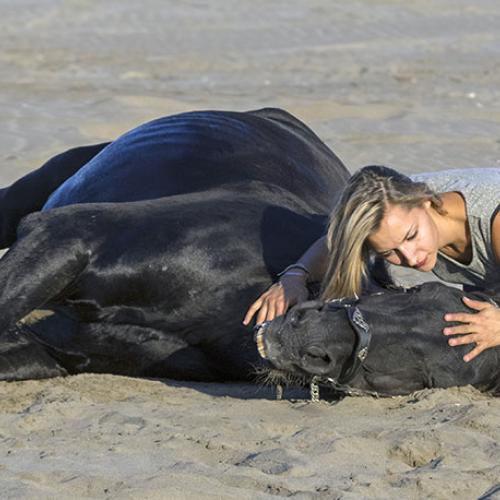There are lots of trainers – good trainers and bad trainers. This is a conversation that comes up a lot with equestrians of all disciplines and all skill levels. When is it time to move on from your current trainer?

Colic by definition refers to any abdominal discomfort your horse may be experiencing. As in people, the number of causes of colic are many. Of primary importance initially is to identify that your horse is showing signs of colic.
The signs of colic vary greatly and the outward manifestations are often, but not always, in direct proportion to the severity of the underlying causative agent. Below, some signs of colic are discussed.
1. Failure to eat
Any change in the normal eating pattern of your horse, from decreased aggression at the feed bucket to complete reluctance to eat, merit intensive investigation. Immediately inspect the feed and hay for spoilage, the stall or feeding area for anything out of the ordinary, evidence of fresh manure piles, and the water source. Horses have been known to defecate in the water trough and unbeknownst to the owner, cease drinking. Prolonged dehydration will lead to signs of abdominal discomfort.
2. Evidence of rolling/self-trauma
Evidence of rolling include a soiled coat, grass/hay in the mane and tail, and abrasions to the extremities, head, and torso of the horse. Such signs merit further evaluation of your horse to ascertain whether colic is involved.
3. Elevated heart rate
A normal horse at rest should have a heart rate around 30 beats per minute (bpm). Mild abdominal pain can elevate the heart rate to 60 bpm while intense pain can see heart rates over 80 bpm. Heart rates can be evaluated with a stethoscope or by palpating the pulse under the lower jaw. In counting the number of beats in 15 seconds and multiplying by four (4), the numbers of beats per minute can be calculated.
4. Pawing/Kicking at flank/Injected mucous membranes/Sweating
A horse with abdominal discomfort will often paw at the ground and kick at its flank. While normal mucous membranes (gums) of horse are pale pink to pink, a horse with colic will often have very red to purple gums depending on the severity of the pain. Discomfort will also cause some horses to sweat excessively with no exertion.
5. Decreased gut sounds
Take the opportunity to listen to the gut sounds your horse makes normally. A stethoscope is the best tool for this evaluation so as to better appreciate when gut sounds are diminished or absent.
If convinced your horse is experiencing colic, contact your veterinarian immediately. Some mild cases can be managed without a veterinary visit but only he/she should make that call. Your veterinarian may recommend walking your horse for an extended period to promote bowel movements and prevent your horse from laying down and rolling, which can potentially cause more severe problems. With continued discomfort, a veterinary evaluation is merited and steps taken to alleviate your horse’s discomfort and ascertain the reason for this discomfort. Many cases of colic can be managed medically by the Veterinarian without having to send the horse to the Veterinary hospital. However an early visit by the Veterinarian will determine the severity of the colic.
There are lots of trainers – good trainers and bad trainers. This is a conversation that comes up a lot with equestrians of all disciplines and all skill levels. When is it time to move on from your current trainer?
While you are working on New Year’s resolutions for yourself, consider making a few for your horse as well. Here are a few suggestions...
Maintaining a healthy weight is essential for horses as they age. Here are a few tips to help keep your horse fit and trim.
Would you know it if your horse was in pain? Even if you knew your horse was in pain, would you know what type of pain he or she was suffering from?